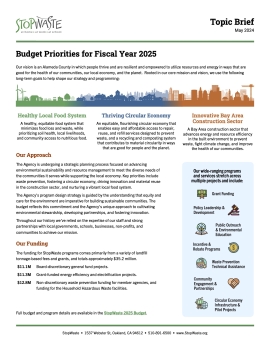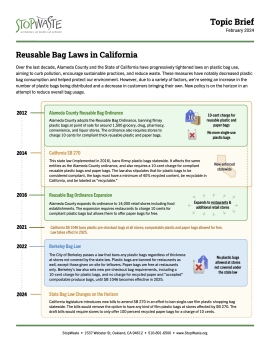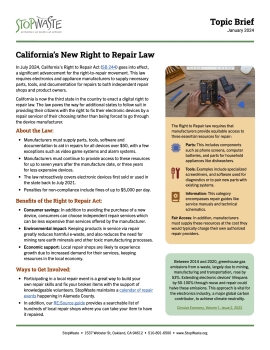Monthly Topic Briefs
Updates on current issues and projects.

California has set ambitious targets to reduce greenhouse gas emissions and slow climate change. Since buildings account for a significant share of energy use and emissions, reducing their reliance on fossil fuels by promoting efficiency and electrification is crucial to meeting those goals and transitioning to cleaner, more resilient buildings.

Materials such as plastic pallet wrap, cardboard boxes, and wooden pallets are essential for securely transporting goods and products across the supply chain. However, these materials are typically discarded after just one use, generating significant packaging waste.

Measure D (The Alameda County Waste Reduction and Recycling Initiative Charter Amendment) was approved by Alameda County voters in 1989 with the goals of reducing waste, promoting recycling, and setting a path toward ambitious landfill diversion targets for the county.

To better understand what types and amounts of materials are in our waste stream, StopWaste periodically conducts waste characterization studies at material processing facilities throughout the county.

Each year, an estimated 8 million people across the country use over 3 billion needles, syringes, lancets, and auto-injectors (collectively known as “sharps”) for at-home medical care. Due to the health and safety risks involved, proper disposal of these items is crucial to prevent:

California’s Bottle Bill has been one of the most successful and cost-effective recycling and litter-reduction programs in the United States, targeting aluminum, glass, plastic, and bimetal containers.

Single-use foodware items, such as plastic and paper cups, plates, and utensils, have a short lifespan but a long-lasting negative impact on human health and the environment. Additionally, most of these single-use foodware items are neither readily recyclable nor compostable, and contaminate recycling and composting programs.

This provides an overview of the StopWaste Budget for FY 2025. It outlines the agency's strategic priorities and funding allocation for the coming year, which focuses on advancing environmental sustainability, fostering a circular economy, driving innovation in construction, and nurturing a local food system through various programs, partnerships, and community engagement.

Happy Earth Month! Whether you’re interested in learning how to get started with worm composting, how to electrify your home, reduce wasted food, or grow your own food, there’s a way to celebrate for everyone!

Spring is the time of fresh beginnings! With the seasonal shift, we are often inspired to clean and declutter our homes. Here are a few tips for a healthier home and planet.

Over the last decade, Alameda County and the State of California have progressively tightened laws on plastic bag use, aiming to curb pollution, encourage sustainable practices, and reduce waste. These measures have notably decreased plastic bag consumption and helped protect our environment.
